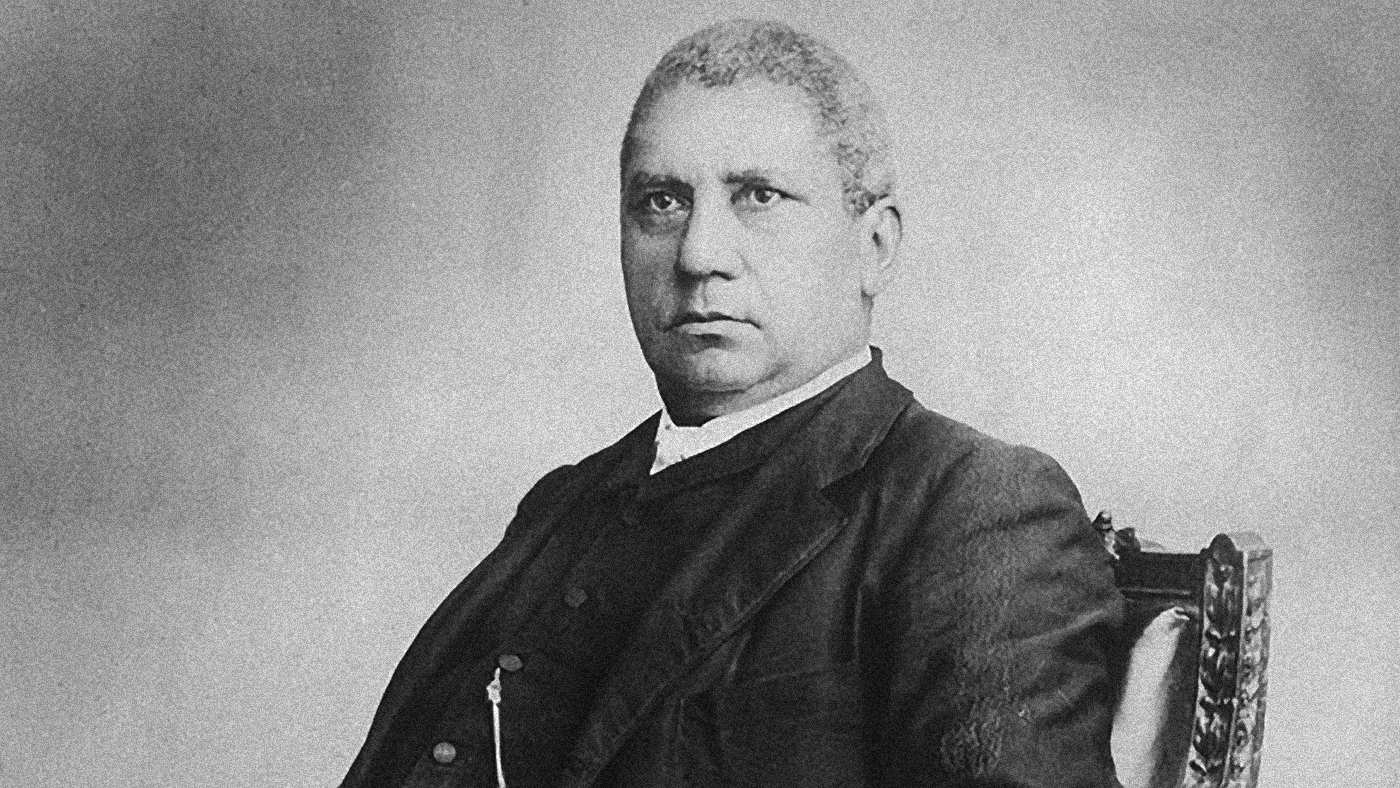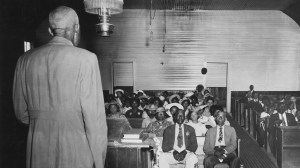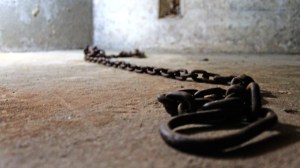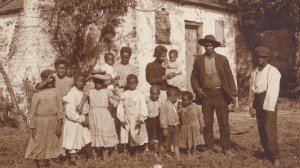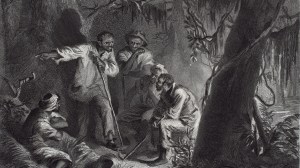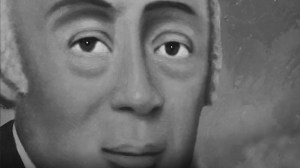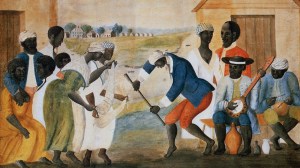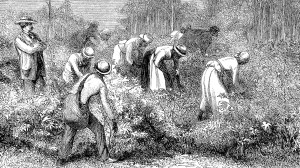In this series

Tradition holds that Henry McNeal Turner’s grandfather was an African prince. While his royal blood did not save him from slave traders who kidnapped him from his nation and brought him to South Carolina in the late 1700s, his lineage ultimately kept him and his family from slavery. South Carolina was a British colony when the prince arrived, and it was against British law to enslave royal blood. Free—but unable to return to home—the prince stayed and married a local woman. The couple gave birth to Turner’s father, Hardy, and in 1834, their grandson was born.
From an early age, Turner’s life was marked by dreams. When Turner was eight, he dreamed that he was standing in front of a large, racially diverse crowd who were looking to him for instruction. He interpreted the dream as God “marking him” for great things, and it ultimately catalyzed his passion for education—at a time when it was illegal for African Americans, free or enslaved, to attend school. In spite of this discrimination, Turner began to teach himself through the help of a divine “dream angel” that he believed appeared to him in his dreams to help him learn. As Turner later told author William Simmons:
I would study with all the intensity of my soul until overcome by sleep at night; then I would kneel down and pray, and ask the Lord to teach me what I was not able to understand myself, and as soon as I would fall asleep an angelic personage would appear with open book in hand and teach me how to pronounce every word that I failed in pronouncing while awake, and on each subsequent day the lessons given me in my dreams would be better understood than any other portions of the lessons. This angelic teacher, or dream teacher, at all events, carried me through the old Webster’s spelling book and thus enabled me to read the Bible and hymnbook.
Despite Turner’s unusual educational method, by the time he was 15 he had read the entire Bible five times and memorized lengthy passages of Scripture.
Turner’s father died while he was still young. After his mother remarried, the family moved to Abbeville, South Carolina, and Turner became a janitor at a law office. Turner’s astute memory and eagerness to learn new things so impressed his white colleagues that they decided to assist their coworker in his education. Turner interpreted their actions as an answer to prayer and poured himself into arithmetic, astronomy, geography, history, law, and theology.
The “Negro Spurgeon”
At the age of 14, Turner, along with his family became members of the Southern Methodist Episcopal Church (SMEC) at a revival service. His conversion would come three years later in 1851 under the preaching of plantation missionary Samuel Leard. In a letter to Leard, Turner recalled his conversion experience:
I joined the Church under Rev. Mr. Crowell, on probation, at Abbeville, in the latter part of 1848, but soon went to cursing and getting drunk whenever I could get whisky, and was the worst boy at Abbeville Court House until you, at Sharon Camp Ground, in 1851, so stunned me by your powerful preaching that I fell upon the ground, rolled in the dirt, foamed at the mouth, and agonized under conviction till Christ relieved me by his atoning blood.
Shortly after his conversion, Turner felt compelled to preach the gospel. His denomination affirmed his calling, licensing him first as an exhorter and sending him to lead prayer meetings among the enslaved people of Abbeville, South Carolina. Two years later, the denomination granted Turner a license to preach. This move was uncharacteristic for the SMEC, a denomination which regularly licensed African Americans as exhorters but only rarely licensed them to preach.
This status allowed Turner to move throughout the slave-holding South, preaching to both black and white audiences. Turner's preaching combined not only Scripture but also outside readings of classics, such as John Milton's Paradise Lost and the writings of popular theologian Thomas Dick. Turner also remembered much of what he read and used it in his extemporaneously delivered sermons. Additionally, Turner presented his erudite sermons in a powerful and eloquently delivered oratory. His preaching earned Turner the nickname "Negro Spurgeon,” nodding to the eloquent English Baptist pastor who was a contemporary of Turner’s.
Turner’s preaching style led some to accuse of him memorizing his sermons and claim he could not speak impromptu. (At that time, impromptu speaking was widely seen a sign that one was lead and carried by the Holy Spirit in one's preaching.) One attendee challenged Turner to preach from a text that the guest would provide at random. Turner accepted the challenge and, “in the Spirit of the Lord,” he expounded on Genesis 7:1, “Come thou and all thy house into the ark." The contents of Turner’s sermon weren’t documented, but reports suggest that not only were the “white citizens well pleased with it,” but after the sermon, the church collected an $810 offering, a small fortune in that day. Turner was also instrumental in a series of revivals in Athens, Georgia, during the spring of 1858. Paired with W. A. Parks, a white minister and “missionary” to blacks, Turner preached “powerful sermons” and held the pulpit of the black Methodist church “up to twice a day during the week.”
Despite Turner’s preaching popularity, his denomination failed to soften its restrictions banning African Americans from ordination or becoming bishops. At the end of the 1850s, Turner left SMEC, joined the African Methodist Episcopal Church (AME), and moved to Baltimore and served briefly as pastor of Waters Chapel AME Church and the Tissue Street Mission. In 1862, Turner became the pastor of the large and influential Israel AME Church in Washington, DC. In the midst of the Civil War, Turner organized a lyceum at his church, where intellectuals and congregants debated important issues of the day such as war and other political matters. In addition to his ministerial duties, Turner became a regular correspondent for the Christian Recorder, the AME’s weekly newspaper. Because his church within walking distance from Capitol Hill, Turner spent hours in its chambers, listening to debates and arguments on the floors of the House and Senate. As pastor of one of the largest black churches in Washington, DC, Turner quickly established himself as a leader in the black community. He befriended several Republican elected officials and became a major supporter of the war effort. Turner campaigned for the use of African American soldiers and helped create what soon became the 1st United States Colored Troops (USCT). After the unit reached its quota of 1,000 men, Turner campaigned for it to have its own chaplain. His petition paid off: In November 1863, President Abraham Lincoln named Turner to the position, making him the first black chaplain in any branch of the military and the only officer in the USCT. In this capacity, he also became a war correspondent, publishing dozens of articles in The Christian Recorder. When the Civil War ended, The Freedmen’s Bureau assigned him to Georgia as an army chaplain.
Church Planting and Politics
After his service in the military, Turner turned his attention to politics. During Reconstruction, Turner became a Republican Party organizer, recruiting black voters throughout Georgia. He helped establish the first Republican state convention, assisted in drafting a new state constitution, and served as a Georgia state representative. However, his victory was short-lived; in the fall of 1868, white members of the state legislature voted to disqualify blacks from holding elected office. Before leaving, however, Turner delivered a speech for the ages. In his opening remarks, Turner thundered:
I wish the members of this House to understand the position that I take. I hold that I am a member of this body. Therefore, sir, I shall neither fawn nor cringe before any party, nor stoop to beg them for my rights. Some of my colored fellow members, in the course of their remarks, took occasion to appeal to the sympathies of members on the opposite side, and to eulogize their character for magnanimity. It reminds me very much, sir, of slaves begging under the lash. I am here to demand my rights and to hurl thunderbolts at the men who would dare to cross the threshold of my manhood. There is an old aphorism which says, "fight the devil with fire," and if I should observe the rule in this instance, I wish gentlemen to understand that it is but fighting them with their own weapon.
Turner then got to the real reason why white legislators voted to expel the African Americans:
The great question, sir, is this: Am I a man? If I am such, I claim the rights of a man. Am I not a man because I happen to be of a darker hue than honorable gentlemen around me? Let me see whether I am or not. I want to convince the House today that I am entitled to my seat here. … God saw fit to vary everything in nature. There are no two men alike, no two voices alike, no two trees alike. God has weaved and tissued variety and versatility throughout the boundless space of His creation. Because God saw fit to make some red, and some white, and some black, and some brown, are we to sit here in judgment upon what God has seen fit to do? As well might one play with the thunderbolts of heaven as with that creature that bears God's image, God's photograph.
He did not regard what the House did as a "thrust" against him; but a thrust against the Bible and God for "making a man and not finishing him," he argued that it was "simply calling the Great Jehovah a fool." He continued:
It is extraordinary that a race such as yours, professing gallantry and chivalry and education and superiority, living in a land where ringing chimes call child and sire to the church of God, a land where Bibles are read and Gospel truths are spoken, and where courts of justice are presumed to exist; it is extraordinary that, with all these advantages on your side, you can make war upon the poor, defenseless black man.
Turner closed his speech by proclaiming
You may expel us, gentlemen, by your votes, today; but, while you do it, remember that there is a just God in Heaven, whose All-Seeing Eye beholds alike the acts of the oppressor and the oppressed, and who, despite the machinations of the wicked, never fails to vindicate the cause of Justice, and the sanctity of His own handiwork.
After his ouster from the Georgia state legislature, Turner became the United States postmaster in Macon, Georgia, the first black ever to hold that position. However, not everyone liked the appointment, including J. C. Swayze, a white Radical Republican and newspaper editor, who felt that he had been passed over for the position and who published a series of articles attacking Turner. Soon after Turner received the position, Marian Harris, a prostitute with whom the married Turner had been involved, was arrested on charges of counterfeit money. While there ultimately was not enough evidence to incriminate Turner, pressure from President Ulysses Grant’s administration led him to resign his post in 1869.
After working for a few years as a customs inspector, Turner turned his efforts on growing the AME Church in the South. His primary goal was to increase membership and build churches. By all accounts, it was an arduous task, made even harder by the violence white confederates inflicted upon black people. Turner was not immune.
As he testified to Congress in 1871, on “two or three occasions, I may say in a dozen instances, if I had not secreted myself in houses at times, in the woods at other times, in a hollow log at another time, I would have been assassinated by a band of night-prowlers, or rovers.” When asked if he had seen any other evidence of night marauders injuring other African Americans, Turner replied that he had seen “scores of them.” He recounted the times he had seen “men who had their backs lacerated” and men “who had bullets in them. He seen others with their “arms shot off; shot so badly that they had to be amputated” and others with their “legs shot off." Despite the danger, Turner persisted. While we do not know the exact number of churches Turner planted or the number of ministers licensed, the AME church credits him with establishing the AME church in Georgia.
By 1876, his hard work paid off and he became publications manager for the AME Church. He was tasked with promoting all of the denomination's publications, including The Christian Recorder, Sunday school material, books published by AME ministers, and any training material for ministers and the laity. The position also allowed him to travel to all the districts and meet pastors and leaders of local churches. During the four years he served as publications manager, Turner developed a following that led to his election as one of the 12 bishops of the church.
As bishop, Turner had a national platform to espouse his ideas on race, politics, lynching, and other social issues of the day, especially emigration. However, after racism went unabated and conservatives rescinded many of the gains African Americans made during Reconstruction, Turner's oratory became increasingly pessimistic. After the Plessy v. Ferguson decision in May 1896, Turner declared that there was no future in the United States for African Americans. His denunciations against the country and his challenging and stinging critiques against other African Americans led many to dismiss Turner.
The most stinging rebukes came after Turner declared that "God is a Negro." One black man, who identified himself as not being a “race man,” declared, “If I should get to heaven and find only Negroes there, I think I would want to take my hat and walk out" while a white minister called the idea "blasphemous." He maintained that "God is not a God of any nationality, or any race, but of the whole human family; and as to color—God is a Spirit to be worshipped by renewed spirits in whatever colored bodies for a time they tabernacle of earth." Turner, however strenuously continued to defend his position. In the latter part of the 19th century, Turner remained active. He served as chair of the board of Morris Brown College from 1896–1908 and kept a busy schedule up to the end of his life. He was in Windsor, Ontario, at the General Conference of the AME Church on May 8, 1915 when he suffered a massive stroke. He died hours later at a Windsor hospital.
Turner left behind a rich legacy. Much of his writing foreshadowed many of the social movements in African American culture during the 20th century. W. E. B. Du Bois’s idea of “cultural nationalism,” Marcus Garvey’s “Back to Africa” movement, the modern-day civil rights movement, the Black Power movement, James Cone’s A Black Theology of Liberation, and even some elements of nationalist rap found in the current hip-hop culture owe a debt to Turner’s work and progressive insights.
But Turner was also public theologian. His oratory, writings, publications, letters, and editorials display a figure who was not limited to the walls of the church but saw the need for public engagement of God-talk in the public arena. His faith followed him from the battlefield of the Civil War to the halls of Congress to the offices of the AME, faith that led him to challenge America to live up to the ideals of freedom, justice, and democracy.
Andre E. Johnson, PhD, is an assistant professor of rhetoric, race and religion at the University of Memphis. He is the author of The Forgotten Prophet: Bishop Henry McNeal Turner and the African American Prophetic Tradition and the director and curator of the Henry McNeal Turner Project, a digital archive aimed at collecting the writings of Turner.

